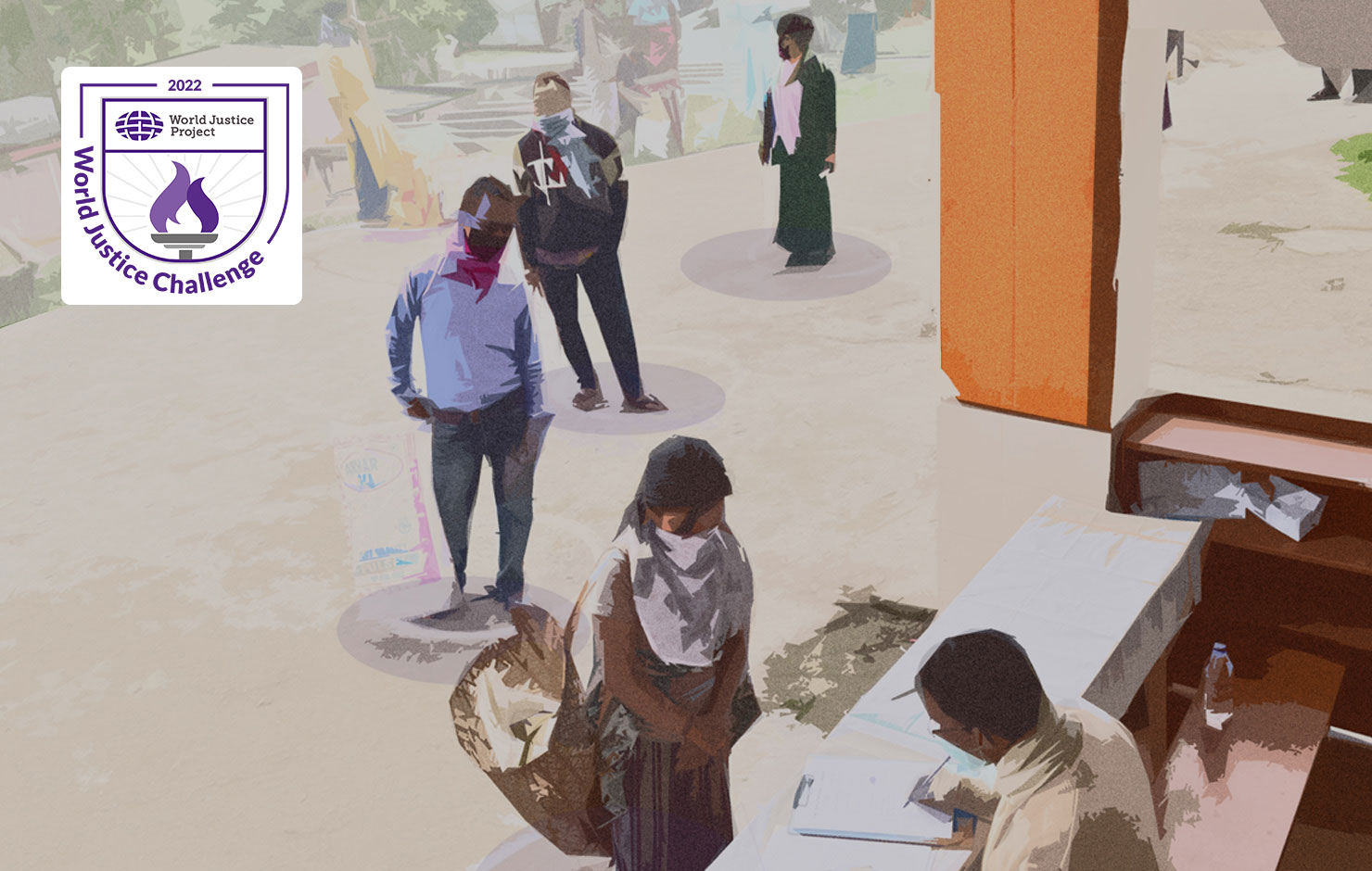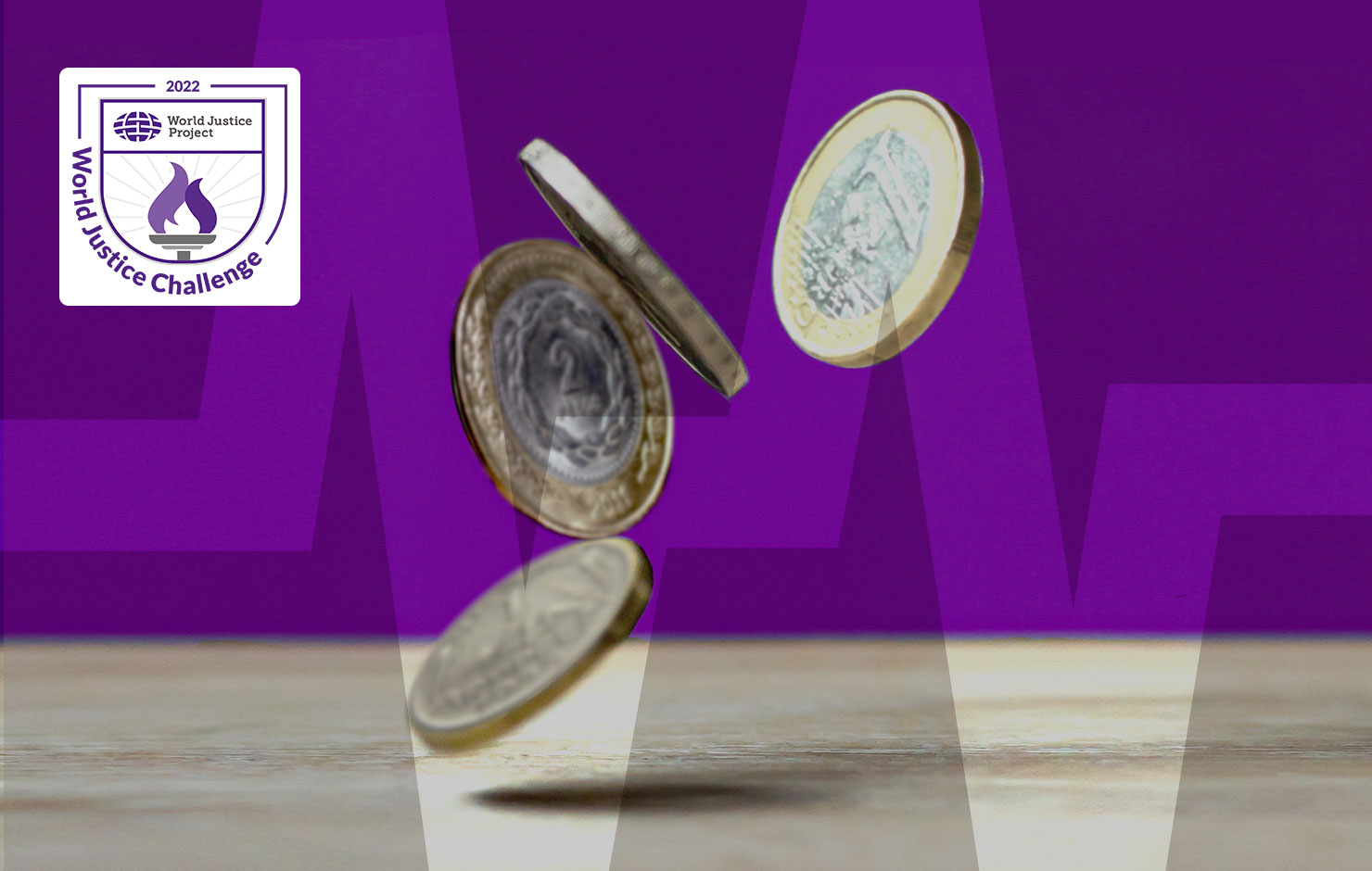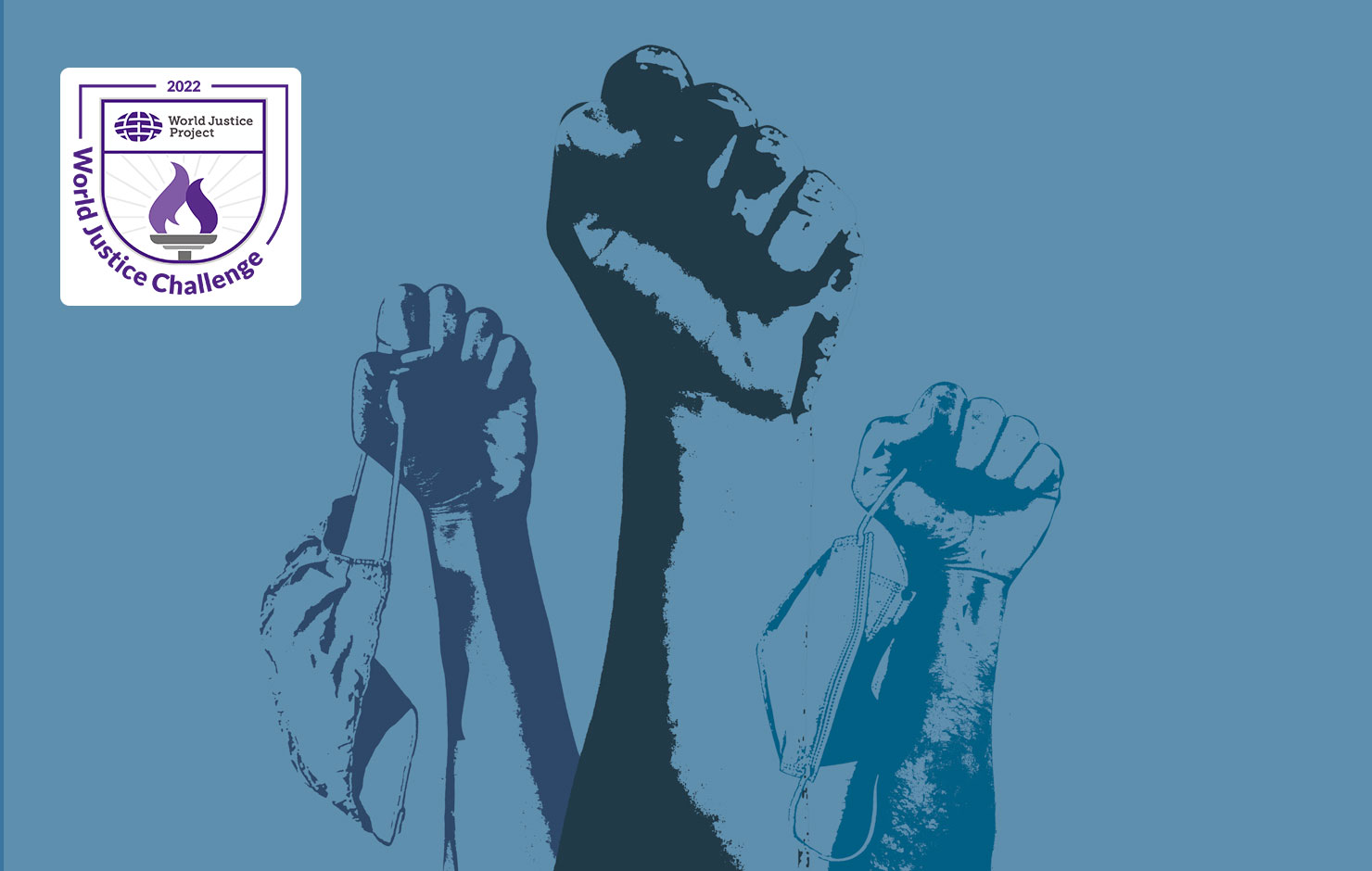Eligibility and Entry Requirements
Access to Justice Guidelines
Anti-Corruption and Open Government Guidelines
Equal Rights and Non-Discrimination Guidelines
Webinars
Judges
Eligibility and Entry Requirements
The deadline for applications has passed. Please stay tuned for the announcement of Challenge finalists and more information about the competition.
- Initiatives addressing at least one of the following Challenge themes, as they relate to addressing structural inequities and fundamental barriers on the path to a just COVID-19 recovery, are eligible to apply:
- The competition is multidisciplinary and open to organizations worldwide, including, but not limited to: non-profits; social entrepreneurs; media; national and multilateral government agencies; local government bodies; businesses/private sector enterprises; bar associations; and law firms from any country or territory in the world.
- Applicants may submit no more than two entries.
- Collaborative entries among several organizations are welcome.
- Entries must be submitted in English.
- Entries will be evaluated according to the following criteria:
- Impact: the initiative has demonstrably made a material contribution to improving an important justice problem in one or more the thematic categories above
- Sustainability: the initiative demonstrates the potential for sustained operation over time
- Scaling/Replicability: the initiative demonstrates potential for expansion in its current context and/or replication in other contexts (e.g. other geographies, populations or sectors)
- Please note that the World Justice Challenge is a one-time prize to recognize effective projects and policies already in progress and is not a grantmaking program for new initiatives on the drawing board. Applications seeking funding for future initiatives will not be considered.
Access to Justice
Problem Statement
The World Justice Challenge 2022: Building More Just Communities seeks to identify, recognize, and promote good access to justice practices and high-impact projects and policies that help ensure the path of recovery from COVID-19 is just and that progress toward achieving the SDGs gets back on track.
Around the world, justice needs are ubiquitous and go largely unmet. WJP’s global legal needs survey of more than 100,000 households in 101 countries found that almost half of those surveyed had experienced at least one legal problem in the last two years. These included problems related to housing, land, family, employment, and many other issues at the heart of people’s economic and social well-being. Of those who reported experiencing a legal problem, more than half were unable to meet their justice needs, amounting to 1.4 billion people with unmet civil and administrative justice needs globally.
While unmet justice needs are a critical concern in and of themselves, they are also costly to people and societies. The WJP study found that more than 2 in 5 people reporting a justice problem also experienced a hardship as a result, such as physical or stress-related ill health, loss of income or employment, or the need to relocate. Legal problems also take an economic toll, costing countries between approximately 0.5 and 3 percent of GDP annually. Meanwhile, the COVID-19 pandemic has resulted in sharp increases in poverty and inequality that have reinforced existing access to justice challenges. Around the world, public health measures meant to limit the spread of COVID-19 have curtailed access to justice by consolidating government powers with less accountability, limiting rights and freedoms, and decreasing access to critical legal services.
The scale and impact of access to justice needs underscore the importance of comprehensive, people-centered approaches to justice services. While these negative trends are serious, the global community also has a unique opportunity to reevaluate and improve justice services and governance structures as a way of strengthening access to justice during and beyond the pandemic recovery period.
Guidelines for Applicants
The World Justice Challenge encourages entries that address systemic access to justice challenges, including, but not limited to:
- Protecting those working in the informal economy and facilitating their entry into formal employment and benefits structures
- Ensuring legal identity for all
- Addressing issues of land tenure and housing rights, including substandard housing, informal settlements, homelessness, dispossession, and land grabs that target indigenous lands
- Addressing the justice needs of migrants, refugees, and other forcibly displaced persons
- Addressing the justice needs of crime victims and detainees
- Addressing the strained capacity of justice systems to meet demands, particularly around healthcare, gender-based violence, housing, employment, and debt issues exacerbated by the pandemic
- Strengthening the capacity of formal or informal justice systems to deliver timely access to justice services and legal resolutions
- Facilitating the rebuilding of justice systems disrupted by the pandemic, including through the use of digital, online, and new technological approaches that are equitable and accessible by most people
- Supporting new approaches to ensure the right to a fair and speedy trial, strengthening access to counsel, and improving the openness of trials and other hearings
Anti-Corruption and Open Government
Problem Statement
The World Justice Challenge 2022: Building More Just Communities seeks to identify, recognize, and promote good anti-corruption and open government practices and high-impact projects and policies that help ensure the path of recovery from COVID-19 is just and that progress toward achieving the SDGs gets back on track.
Corruption poses a grave and fundamental threat to the rule of law. Corrupt practices weaken judicial integrity, erode trust in public institutions, and undermine the application of accessible and impartial justice. These practices typically go hand-in-hand with opaque and unaccountable governance, whereby public resources for essential goods and services are diverted for private gain. As these resources disappear to corruption, barriers to the fulfillment of fundamental rights and human development multiply, with particularly harmful impacts for marginalized communities. Discrimination and corruption are often mutually reinforcing, as discrimination enables and drives corruption in ways that deepen inequality and obstruct equitable access to justice.
The COVID-19 pandemic has heightened these corruption risks. Governments have mobilized massive resources to respond to health and economic crises, while at the same time enacting emergency procurement procedures and suspending corruption prevention and enforcement mechanisms. Each of these measures has increased the risk for corruption, fraud and waste. Even prior to the pandemic, the health sector had a serious corruption problem. In a 2019 report, Transparency International estimated that corruption in the health sector costs $500 billion per year globally. This contributes to the already staggering economic consequences of corruption. Corrupt practices such as bribery, tax evasion, theft of public funds, and other illicit financial flows cost developing countries approximately $1.26 trillion per year.
Collectively, corruption’s consequences have detrimental implications for achieving the Sustainable Development Goals (SDGs) and their promise to “leave no one behind.” SDG 16, with its targets for reducing bribery and strengthening institutions, creates an explicit link between corruption, just and inclusive societies, and the conditions for meeting all 17 SDGs. As we rebuild towards fairer and healthier communities, it will be critical to prioritize evidence-based strategies to strengthen open and accountable governance and curb corruption.
Guidelines for Applicants
The World Justice Challenge encourages entries that address systemic corruption and open government challenges, including, but not limited to:
- Vetting suppliers, tracking financial flows, disclosing beneficial ownership, and supporting public complaint or whistleblower mechanisms
- Ensuring the open publication of public contracts • Ensuring openness of government distribution of economic recovery and social support programs
- Strengthening mechanisms that provide oversight and accountability for elected and appointed officials, including judges
- Protecting the right to information and the proactive publication of government data
- Strengthening the ability of independent media to track and report on corrupt practices
- Supporting citizen participation in public decision making at the local and national levels
- Ensuring fiscal openness, including budget and expenditure data transparency and oversight mechanisms • Ensuring accountability of public works, expenditures and infrastructures
- Using innovative techniques for identifying, investigating and documenting corruption, including through the use of data analytics
Equal Rights and Non-Discrimination
Problem Statement
The World Justice Challenge 2022: Building More Just Communities seeks to identify, recognize, and promote good equal rights and non-discrimination practices and high-impact projects and policies that help ensure the path of recovery from COVID-19 is just and that progress toward achieving the SDGs gets back on track.
The COVID-19 pandemic has weakened human rights protections and worsened structural discrimination globally. According to the World Justice Project Rule of Law Index®, over the past year 70 percent of countries declined in their fundamental rights score, which measures factors such as equal treatment and absence of discrimination, freedom of religion and belief, right to privacy, and guarantees on freedom of assembly, association, opinon, and expression. This is part of a distressing multi-year trend, in which more countries have regressed on this indicator than any other rule of law factor over the last six years.
The pandemic has especially exacerbated the systemic marginalization of minority groups and vulnerable populations. In many places, government responses to the pandemic have entailed inequitable social protection and service delivery, repressive emergency measures, and other discriminatory policies that directly threaten the lives, livelihoods, and dignity of marginalized communities. These restrictive practices are often implemented with minimal oversight and in a manner that infringes on fundamental human rights. Indigenous peoples, migrants, and ethnic and religious minorities have been especially affected by blanket bans on freedom of assembly and movement, which in some cases serve as a pretext for discriminatory government agendas.
Meanwhile, COVID-19 has taken a disproportionate toll on women and girls. Lockdowns early in the pandemic led to higher rates of domestic violence and barriers to reproductive health services, while school closures removed girls from educational opportunities and increased their likelihood for child marriage. The pandemic’s consequences have also been detrimental for economic equality, as women experienced a five percent global job loss last year, compared with only a 3.9 percent loss for men.
The road to pandemic recovery will require intersectional, people-centered approaches to re-establish and strengthen equal rights and non-discrimination protections. Dismantling these systemic inequities, which COVID-19 both exposed and amplified, must be central in order for the “build back better” agenda to succeed.
Guidelines for Applicants
The World Justice Challenge encourages entries that address systemic barriers to equal rights and non-discrimination, including, but not limited to:
- Addressing systemic discrimination and unequal treatment of women and girls, racial, ethnic and religious minorities, LGBTI+ communities, people with disabilities, migrants, indigenous communities, and other marginalized groups
- Ensuring women and girls, racial, ethnic and religious minorities, LGBTI+ communities, people with disabilities, migrants, indigenous communities, and other marginalized groups are included in both short- and long-term economic and social recovery plans
- Addressing gender-based violence
- Tackling the discriminatory impacts of climate and other environmental problems
- Protecting journalists and other media workers, especially those from historically disadvantaged communities
- Protecting human rights defenders and the lawyers who represent them, especially from historically disadvantaged communities
- Protecting the right to peaceful assembly and/or association free of discrimination and unwarranted interference
- Protecting the right to privacy in accordance with norms of legality, necessity, proportionality, and non-discrimination
- Ensuring digital technology is created and deployed in ways that reduce or eliminate inherent biases and discrimination
- Challenging discriminatory practices and policies relating to arrest, detention, prosecution, probation, or exile
- Strengthening the implementation and/or enforcement of hate crimes legislation
Watch the World Justice Challenge 2022 Webinar
Judges
The World Justice Project and its partners are grateful to the World Justice Challenge judging panel for providing their expertise in selecting winning projects in the following categories: Access to Justice; Anti-Corruption and Open Government; Equal Rights and Open Government; and the Data for Justice Prize.
Betty Barkha
Jan Beagle
Sharan Burrow
Laura Chinchilla
Hina Jilani
Mondli Makhanya
Judge M. Margaret McKeown
Jan Pronk
James R. Silkenat
David Steuer



